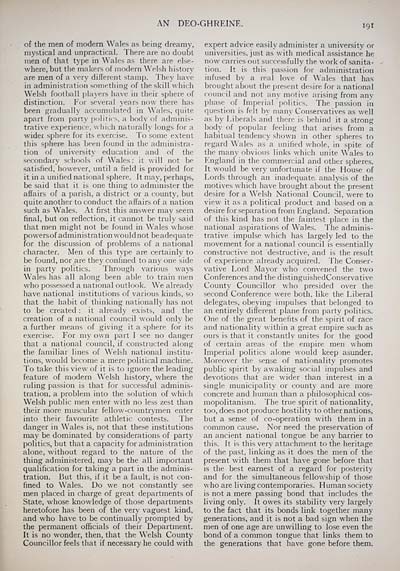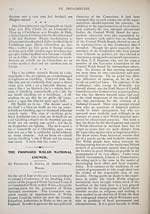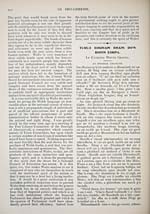Blair Collection > Deo-gréine
(213)
Download files
Complete book:
Individual page:
Thumbnail gallery: Grid view | List view

AN DEO-GHREINE.
191
of the men of modern Wales as being dreamy,
mystical and unpractical. There are no doubt
men of that type in Wales as there are else-
where, but the makers of modern Welsh history
are men of a very different stamp. They have
in administration something of the skill which
Welsh football players have in their sphere of
distinction. For several years now there has
been gradually accumulated in Wales, quite
apart from party politics, a body of adminis-
trative experience, which naturally longs for a
wider sphere for its exercise. To some extent
this sphere has been found in the administra-
tion of university education and of the
secondary schools of Wales : it will not be
satisfied, however, until a field is provided for
it in a unified national sphere. It may, perhaps,
be said that it is one thing to administer the
affairs of a parish, a district or a county, but
quite another to conduct the affairs of a nation
such as Wales. At first this answer may seem
final, but on reflection, it cannot be truly said
that men might not be found in Wales whose
powersof administration wouldnot beadequate
for the discussion of problems of a national
character. Men of this type are certainly to
be found, nor are they confined to any one side
in party politics. Through various ways
Wales has all along been able to train men
who possessed a national outlook. We already
have national institutions of various kinds, so
that the habit of thinking nationally has not
to be created : it already exists, and the
creation of a national council would only be
a further means of giving it a sphere for its
exercise. For my own part I see no danger
that a national council, if constructed along
the familiar lines of Welsh national institu-
tions, would become a mere political machine.
To take this view of it is to ignore the leading
feature of modern Welsh history, where the
ruling passion is that for successful adminis-
tration, a problem into the solution of which
Welsh public men enter with no less zest than
their more muscular fellow-countrymen enter
into their favourite athletic contests. The
danger in Wales is, not that these institutions
may be dominated by considerations of party
politics, but that a capacity for administration
alone, without regard to the nature of the
thing administered, may be the all important
qualification for taking a part in the adminis-
tration. But this, if it be a fault, is not con-
fined to Wales. Do we not constantly see
men placed in charge of great departments of
State, whose knowledge of those departments
heretofore has been of the very vaguest kind,
and who have to be continually prompted by
the permanent officials of their Department.
It is no wonder, then, that the Welsh County
Councillor feels that if necessary he could with
expert advice easily administer a university or
universities, just as with medical assistance he
now carries out successfully the work of sanita-
tion. It is this passion for administration
infused by a real love of Wales that has
brought about the present desire for a national
council and not any motive arising from any
phase of Imperial politics. The passion in
question is felt by many Conservatives as well
as by Liberals and there is behind it a strong
body of popular feeling that arises from a
habitual tendency shown in other spheres to
regard Wales as a unified whole, in spite of
the many obvious links which unite Wales to
England in the commercial and other spheres.
It would be very unfortunate if the House of
Lords through an inadequate analysis of the
motives which have brought about the present
desire for a Welsh National Council, were to
view it as a political product and based on a
desire for separation from England. Separation
of this kind has not the faintest place in the
national aspirations of Wales. The adminis-
trative impulse which has largely led to the
movement for a national council is essentially
constructive not destructive, and is the result
of experience already acquired. The Conser-
vative Lord Mayor who convened the two
Conferences and the distinguishedConservative
County Councillor who presided over the
second Conference were both, like the Liberal
delegates, obeying impulses that belonged to
an entirely different plane from party politics.
One of the great benefits of the spirit of race
and nationality within a great empire such as
ours is that it constantly unites for the good
of certain areas of the empire men whom
Imperial politics alone would keep asunder.
Moreover the sense of nationality promotes
public spirit by awaking social impulses and
devotions that are wider than interest in a
single municipality or county and are more
concrete and human than a philosophical cos-
mopolitanism. The true spirit of nationality,
too, does not produce hostility to other nations,
but a sense of co-operation with them in a
common cause. Nor need the preservation of
an ancient national tongue be any barrier to
this. It is this very attachment to the heritage
of the past, linking as it does the men of the
present with them that have gone before that
is the best earnest of a regard for posterity
and for the simultaneous fellowship of those
who are living contemporaries. Human society
is not a mere passing bond that includes the
living only. It owes its stability very largely
to the fact that its bonds link together many
generations, and it is not a bad sign when the
men of one age are unwilling to lose even the
bond of a common tongue that links them to
the generations that have gone before them.
191
of the men of modern Wales as being dreamy,
mystical and unpractical. There are no doubt
men of that type in Wales as there are else-
where, but the makers of modern Welsh history
are men of a very different stamp. They have
in administration something of the skill which
Welsh football players have in their sphere of
distinction. For several years now there has
been gradually accumulated in Wales, quite
apart from party politics, a body of adminis-
trative experience, which naturally longs for a
wider sphere for its exercise. To some extent
this sphere has been found in the administra-
tion of university education and of the
secondary schools of Wales : it will not be
satisfied, however, until a field is provided for
it in a unified national sphere. It may, perhaps,
be said that it is one thing to administer the
affairs of a parish, a district or a county, but
quite another to conduct the affairs of a nation
such as Wales. At first this answer may seem
final, but on reflection, it cannot be truly said
that men might not be found in Wales whose
powersof administration wouldnot beadequate
for the discussion of problems of a national
character. Men of this type are certainly to
be found, nor are they confined to any one side
in party politics. Through various ways
Wales has all along been able to train men
who possessed a national outlook. We already
have national institutions of various kinds, so
that the habit of thinking nationally has not
to be created : it already exists, and the
creation of a national council would only be
a further means of giving it a sphere for its
exercise. For my own part I see no danger
that a national council, if constructed along
the familiar lines of Welsh national institu-
tions, would become a mere political machine.
To take this view of it is to ignore the leading
feature of modern Welsh history, where the
ruling passion is that for successful adminis-
tration, a problem into the solution of which
Welsh public men enter with no less zest than
their more muscular fellow-countrymen enter
into their favourite athletic contests. The
danger in Wales is, not that these institutions
may be dominated by considerations of party
politics, but that a capacity for administration
alone, without regard to the nature of the
thing administered, may be the all important
qualification for taking a part in the adminis-
tration. But this, if it be a fault, is not con-
fined to Wales. Do we not constantly see
men placed in charge of great departments of
State, whose knowledge of those departments
heretofore has been of the very vaguest kind,
and who have to be continually prompted by
the permanent officials of their Department.
It is no wonder, then, that the Welsh County
Councillor feels that if necessary he could with
expert advice easily administer a university or
universities, just as with medical assistance he
now carries out successfully the work of sanita-
tion. It is this passion for administration
infused by a real love of Wales that has
brought about the present desire for a national
council and not any motive arising from any
phase of Imperial politics. The passion in
question is felt by many Conservatives as well
as by Liberals and there is behind it a strong
body of popular feeling that arises from a
habitual tendency shown in other spheres to
regard Wales as a unified whole, in spite of
the many obvious links which unite Wales to
England in the commercial and other spheres.
It would be very unfortunate if the House of
Lords through an inadequate analysis of the
motives which have brought about the present
desire for a Welsh National Council, were to
view it as a political product and based on a
desire for separation from England. Separation
of this kind has not the faintest place in the
national aspirations of Wales. The adminis-
trative impulse which has largely led to the
movement for a national council is essentially
constructive not destructive, and is the result
of experience already acquired. The Conser-
vative Lord Mayor who convened the two
Conferences and the distinguishedConservative
County Councillor who presided over the
second Conference were both, like the Liberal
delegates, obeying impulses that belonged to
an entirely different plane from party politics.
One of the great benefits of the spirit of race
and nationality within a great empire such as
ours is that it constantly unites for the good
of certain areas of the empire men whom
Imperial politics alone would keep asunder.
Moreover the sense of nationality promotes
public spirit by awaking social impulses and
devotions that are wider than interest in a
single municipality or county and are more
concrete and human than a philosophical cos-
mopolitanism. The true spirit of nationality,
too, does not produce hostility to other nations,
but a sense of co-operation with them in a
common cause. Nor need the preservation of
an ancient national tongue be any barrier to
this. It is this very attachment to the heritage
of the past, linking as it does the men of the
present with them that have gone before that
is the best earnest of a regard for posterity
and for the simultaneous fellowship of those
who are living contemporaries. Human society
is not a mere passing bond that includes the
living only. It owes its stability very largely
to the fact that its bonds link together many
generations, and it is not a bad sign when the
men of one age are unwilling to lose even the
bond of a common tongue that links them to
the generations that have gone before them.
Set display mode to: Large image | Transcription
Images and transcriptions on this page, including medium image downloads, may be used under the Creative Commons Attribution 4.0 International Licence unless otherwise stated. ![]()
| Early Gaelic Book Collections > Blair Collection > Deo-gréine > (213) |
|---|
| Permanent URL | https://digital.nls.uk/76700036 |
|---|
| Description | A selection of books from a collection of more than 500 titles, mostly on religious and literary topics. Also includes some material dealing with other Celtic languages and societies. Collection created towards the end of the 19th century by Lady Evelyn Stewart Murray. |
|---|
| Description | Selected items from five 'Special and Named Printed Collections'. Includes books in Gaelic and other Celtic languages, works about the Gaels, their languages, literature, culture and history. |
|---|

